No Brexpity please, we’re British
BRUSSELS -- It's not the despair -- it's the pity I can't stand.
As a Brit in Brussels, I have received the sympathies of a string of well-meaning European colleagues over the political chaos in Britain since it voted to leave the EU, often accompanied by a reassuring pat on the arm.
Don't get me wrong, their kind gestures are always much appreciated at a time when I am watching my native land from a distance as it lurches from one drama to another.
But every time I see their pitying looks, a sense of surreality descends on me. Am I really that guy? The one whose country is in crisis? It was not meant to be this way; it was meant to be Greece or somewhere else that went awry, not stolid Britain.
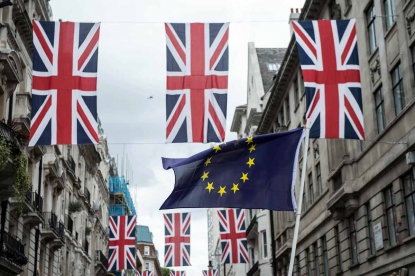 (AFP / Chris J Ratcliffe)
(AFP / Chris J Ratcliffe)But in Brussels, the home of Rene Magritte, the Belgian father of surrealism, there is a sense of everything having somehow fallen down the rabbit hole since the British referendum on June 23.
To start with there was the night the polls closed, when Brussels was hit by its biggest electrical storm for years, creating ominous skies where lightning and a rainbow were visible at the same time over the hulking European Commission building.
The morning after, waking up early and looking at Twitter, wondering if the first tweets with jokes about how England would now have to pull out of the European football championships were some kind of mistake, before the truth dawned and an unexpected "Leave" victory appeared imminent.
The looks on French colleagues' faces in the office was a mixture of distant yet horrified fascination, that I recognised as the same look I used to give my colleagues in Pakistan and Afghanistan when their countries were gripped by turmoil.
The extraordinary press conference on the morning of June 24, where European Commission chief Jean-Claude Juncker, looking tired and with his tie askew, gave a one-word answer -- “No” -- when asked if Brexit was the beginning of the end of the EU, and walked out to applause from officials -- the first time I'd ever seen an ovation like that in Brussels.
"Is this end of the EU?" "No" replies Juncker - walks out to thunderous applause. Surreal. #Brexit @afpfr @AFP pic.twitter.com/tzrJYuWBR9
— Loïc Hofstedt (@LoicHofstedt) June 24, 2016
The British official and journalist seen crying at the same press briefing as the enormity of the vote sunk in.
The unshaven EU officials staring at their iPads as if hoping they could somehow swipe away the problem.
The pervading sense of denial at the shock result, brought home in one case when a diplomat said, over a meal of mi-cuit salmon in an exclusive dining room overlooking Brussels, that Britain would probably never trigger its divorce.
The British officials left with nothing to do at their EU embassy because the country had virtually no functioning government any more.
The anti-EU UK Independence Party chief Nigel Farage apparently celebrating his victory with drinks in a Brussels pub, his back turned on the television showing England being knocked out of Euro 2016 by footballing minnows Iceland.
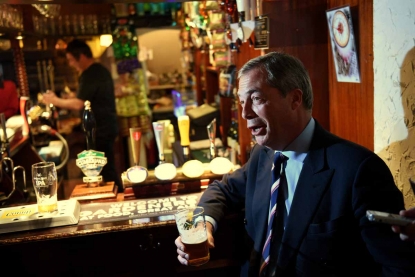 Nigel Farage at a pub in Britain in 2014.
(AFP / Oli Scarff)
Nigel Farage at a pub in Britain in 2014.
(AFP / Oli Scarff)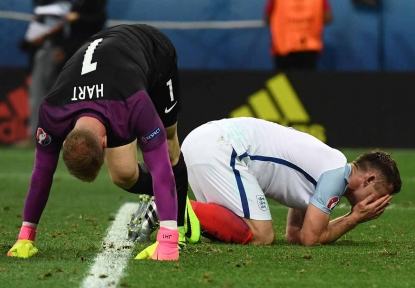 England players in despair after losing to Iceland, June, 2017. (AFP / Anne-christine Poujoulat)
England players in despair after losing to Iceland, June, 2017. (AFP / Anne-christine Poujoulat)
The sense of a phony war as Prime Minister David Cameron turned up for his final EU summit, despite having said days earlier that he would resign, and knowing that he would be frozen out of the second day of the meeting.
And the knowledge that we will be reporting on this story for at least the next two years, and possibly seven, if you go by EU President Donald Tusk's warning.
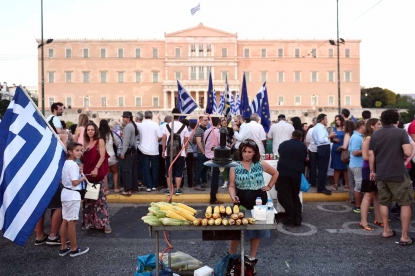 A pro-EU demonstration in Athans in July, 2015. (AFP / Louisa Gouliamaki)
A pro-EU demonstration in Athans in July, 2015. (AFP / Louisa Gouliamaki)The fact that it all came almost exactly a year since Greece called a referendum on its EU-IMF bailout was the icing on the cake.
Twelve months ago we had been writing about how Athens was on the verge of crashing out of the eurozone, and Brussels journalists would shake their heads at the chaos engulfing Greece, with sympathetic words for their Greek colleagues.
Now I know how they feel, as I write about the convulsions in my own country.
The daze of tiredness from the frantic work after the result was something of a blessing, making it easier to keep some objectivity about a subject that has so much personal impact.
Instead of worrying about my children's future, about how I could get Irish citizenship through my mother, about what it would mean for my brother and his Spanish wife, I could just keep working.
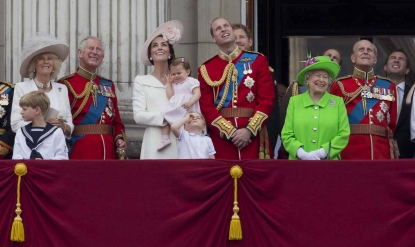 (AFP / Justin Tallis)
(AFP / Justin Tallis)But that distance has also allowed me to have some idea of how the rest of the world really sees Britain. I got a first taste of this while working in AFP's London bureau from 2010 to 2014 when I realised for the first time that what an international audience really wants to read about is the royal family, more than anything else.
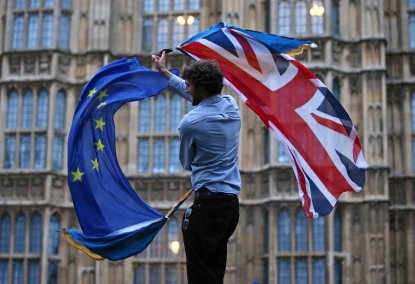 (AFP / Justin Tallis)
(AFP / Justin Tallis)But now, post-Brexit vote, I truly could see Britain through the looking glass: a place that to the rest of the world appeared to have lost its collective marbles, turning its back on decades of the post-war global order and cutting itself off from the continent.
The first time I went back to Britain after the referendum, about one week after the vote, I was almost fearful about what I would find there. Reports of a huge rise in racist incidents, rising xenophobia and a sense of crisis made me wonder whether I would be a stranger in my own land.
London looked the same but the first friend I spoke to told me about two racist incidents he personally knew of.
Still, the British weather -- second only to Belgium's when it comes to grey skies and rain -- was kind enough to roll out the welcome mat with a huge rainbow over St Pancras station as I arrived.
Whether we are now over the rainbow or still down the rabbit hole is yet to be seen.
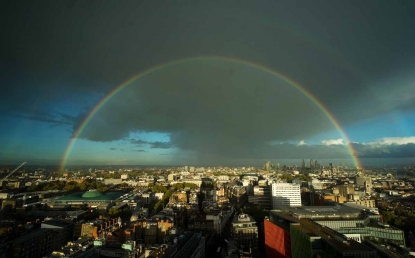 London. (AFP / Leon Neal)
London. (AFP / Leon Neal)


